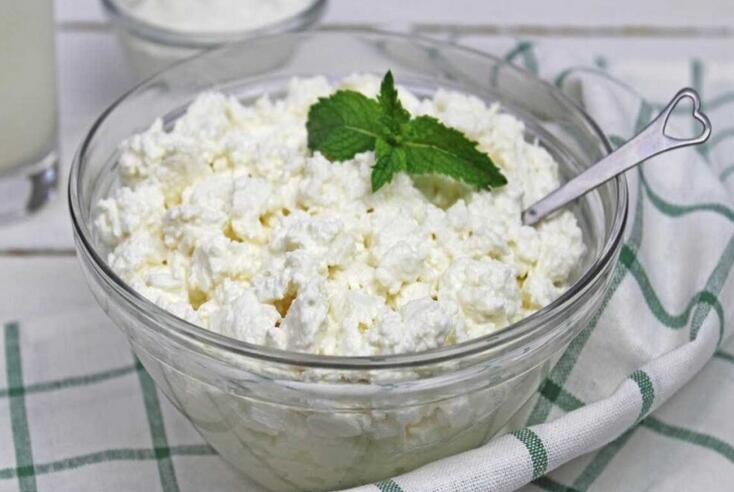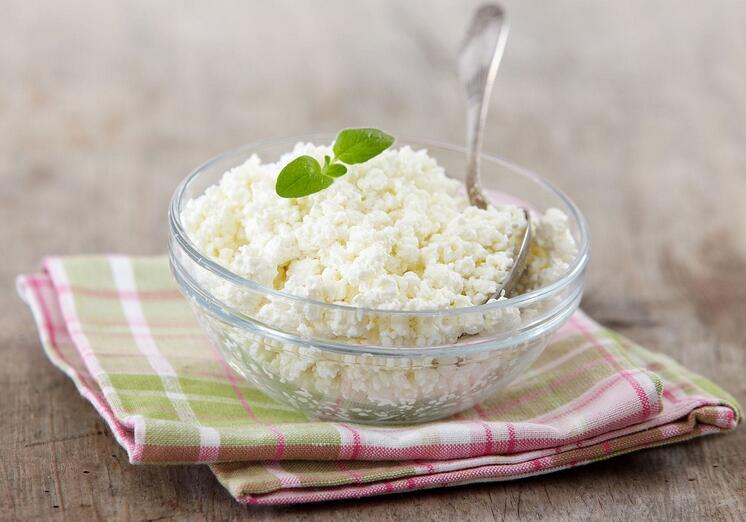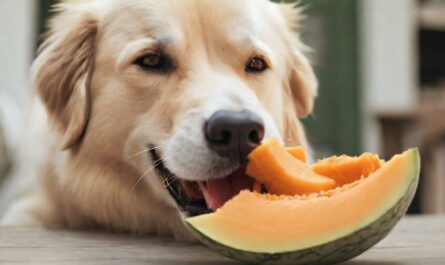Cottage cheese is a common dairy product that many dog owners wonder about feeding to their furry friends. Can dogs eat cottage cheese? Is cottage cheese good or bad for dogs? What are the benefits and potential risks? This article will cover everything you need to know about cottage cheese for dogs.
Table of Contents
ToggleCottage cheese is a soft, mild cheese curd product that is a good source of protein, calcium, and other nutrients. Many dogs love the taste of cottage cheese as an occasional treat. However, there are some potential downsides, such as digestive issues if your dog is lactose intolerant. Overall, cottage cheese can be a healthy option for dogs in moderation and if properly introduced into their diet.
Is Cottage Cheese Safe for Dogs to Eat?
The first question many dog owners have is simply, can dogs eat cottage cheese safely? The answer is yes, dogs can safely eat cottage cheese, but there are some things to consider.
Cottage cheese is relatively low in lactose compared to other dairy products. Therefore, it is less likely to cause digestive upset in dogs. Many dogs tolerate cottage cheese quite well.
However, some dogs are lactose intolerant or sensitive to dairy foods. Feeding too much cottage cheese could result in diarrhea, gas, bloating, and other signs of stomach distress.
It’s best to start with small amounts of cottage cheese when first introducing it into your dog’s diet. Monitor your dog’s reaction and adjust the amounts accordingly. Only feed larger portions if your dog shows no adverse effects.

Health Benefits of Cottage Cheese for Dogs
When fed in moderation, cottage cheese can provide some important nutritional benefits for dogs, such as:
- High-Quality Protein: Cottage cheese is a good source of protein, which provides amino acids that help maintain and repair muscle tissue.
- Calcium for Healthy Bones: Cottage cheese contains calcium and phosphorus, which are essential minerals for strong, healthy bones. This makes it beneficial for puppies and senior dogs.
- Probiotics for Digestive Health: Cottage cheese often contains live cultures and probiotics that can support healthy digestion. This may help dogs prone to diarrhea or constipation.
- Vitamins and Minerals: Cottage cheese contains B vitamins, zinc, selenium, and other vitamins and minerals dogs need in their diet.
- Healthy Fats: The fat content in cottage cheese is relatively low, but provides fatty acids dogs require. Go for low-fat versions.
So in the right amounts, cottage cheese can be a nutritious supplement for many dogs. Just be sure not to overfeed it.
Is Cottage Cheese Safe for Dogs with Lactose Intolerance?
Some dogs are lactose intolerant, meaning they lack the enzyme needed to properly digest the lactose in dairy products. For these dogs, cottage cheese may cause digestive upset.
Signs of lactose intolerance in dogs can include diarrhea, vomiting, gas, abdominal pain, and bloating after consuming dairy foods. If your dog shows these signs, they should avoid cottage cheese.
However, the lactose content in cottage cheese is relatively low compared to milk. Some lactose intolerant dogs may be able to handle small amounts of cottage cheese without issue. Start with just a teaspoon and monitor your dog’s reaction.
You can also opt for lactose-free cottage cheese if available. Or consider switching to non-dairy cheeses like mozzarella that may be better tolerated. Check with your vet if you are concerned about your dog’s lactose tolerance.
How Much Cottage Cheese Can Dogs Eat?
When giving cottage cheese to your dog for the first time, start with small amounts. Give your dog just 1-2 teaspoons at first, then gradually increase to a few tablespoons if no digestive upset occurs.
The maximum amount depends on your dog’s size and individual tolerance. Most experts recommend cottage cheese should comprise no more than 10% of your dog’s total daily calories. For an average size dog, that’s about 2-3 tablespoons per day. Large breed dogs may tolerate up to 1/4 cup.
Stick to feeding cottage cheese as an occasional treat a few times per week, rather than everyday. Too much could lead to weight gain or digestive issues. Monitor your dog’s reaction each time to determine appropriate portion sizes.
Tips for Feeding Your Dog Cottage Cheese
If you want to feed your furry friend cottage cheese, here are some tips to do it safely:
- Choose low-fat or fat-free organic cottage cheese. The lower fat versions are better for dogs.
- Introduce slowly at first and watch for signs of intolerance. Diarrhea or vomiting may mean your dog cannot tolerate this dairy product.
- Select cottage cheese with live cultures for probiotic benefits. This may improve digestibility.
- Feed cottage cheese as an occasional treat or meal topper, not a staple of their diet. Too much can cause weight gain.
- Avoid flavored cottage cheeses with added sugars, fruits or vegetables. Stick to plain.
- Don’t free feed. Serve measured portions and monitor your dog’s consumption.
- Refrigerate leftovers and discard after 3 days. Don’t leave cottage cheese out too long.
Following these tips will help provide your dog the benefits of cottage cheese safely. Consult your veterinarian if you have any concerns.
What are the Risks of Feeding Dogs Cottage Cheese?
While cottage cheese can provide nutritional benefits, there are also some potential risks to consider:
- Digestive Upset: Too much cottage cheese may cause diarrhea, gas, vomiting, and other signs of stomach distress or food intolerance, especially in lactose intolerant dogs.
- Weight Gain: Cottage cheese is relatively high in fat and calories. Too much added to a dog’s diet could lead to obesity over time.
- Salt Content: Cottage cheese contains a fairly high amount of sodium, which could be problematic for dogs prone to heart disease.
- Allergies: As with any food, some dogs may have allergic reactions to the proteins in dairy products like cottage cheese. Diarrhea, itching, hot spots or ear infections could occur.
- Eating Too Fast: The soft texture of cottage cheese may pose a choking risk for dogs that eat too fast. Be sure to serve it slowly in a bowl.
By starting with small amounts and supervising your dog, you can minimize these risks and spot any negative reactions right away. But it is always a good idea to check with your veterinarian before introducing new foods.
Healthier Cheese Options for Dogs
If your dog doesn’t tolerate cottage cheese well, there are some other cheese varieties that may be better options, such as:
- Mozzarella: This mild cheese is lower in lactose and fat, making it less likely to cause digestive upset.
- Feta: Feta is also relatively low in lactose while providing protein and probiotics. Go for low-salt versions.
- Cheddar: Harder cheddar is easier to digest than soft cheeses for some dogs. Opt for low or reduced-fat cheddar.
- Parmesan: This hard cheese is typically lactose-free and grated parmesan makes a tasty, low-calorie topping.
- Monterey Jack: Monterey Jack has a mild flavor and melts well for recipes. Just avoid high-fat versions.
Talk to your veterinarian about whether these or other cheeses may be better alternatives if your dog struggles with cottage cheese. Start slowly with small amounts of any new food.
Is Cottage Cheese Good for Homemade Dog Food Recipes?
Many dog owners like to prepare homemade meals for their dogs. Cottage cheese can be included in some healthy homemade dog food recipes in moderation. It provides protein, calcium and live probiotics.
Some tasty recipes that feature cottage cheese for dogs include:
- Cottage cheese and ground turkey or chicken mixed with rice or pasta
- Cottage cheese “meatballs” using egg and whole wheat breadcrumbs
- Fruit and cottage cheese parfaits with banana, blueberries and yogurt
- Stuffed kongs with cottage cheese and pea puree frozen as a treat
When making homemade dog food with cottage cheese, be sure to calculate the proper nutritional balance. Consult your veterinarian for recipe ideas and proportions best suited to your dog’s needs.
Should You Avoid Giving Cottage Cheese to Dogs?
Most healthy dogs can enjoy cottage cheese in moderation with no issues. However, there are some cases where cottage cheese may be best avoided, including:
- Puppies under 12 weeks old – their digestive systems may not be able to handle dairy foods yet.
- Elderly dogs with compromised immune systems or heart disease – excess sodium could pose risks.
- Dogs with kidney disease or hypercalcemia – the phosphorus and calcium could worsen these conditions.
- Overweight or obese dogs – cottage cheese is relatively high in fat and calories.
- Dogs with a history of digestive issues like inflammatory bowel disease or pancreatitis.
If your dog falls into one of these categories, check with your veterinarian before feeding cottage cheese. They may recommend avoiding this dairy product or at least limiting the amounts.
Signs your dog should not eat cottage cheese include diarrhea, vomiting, or other reactions after consuming even small amounts. Some dogs have sensitivities or intolerances to dairy products. Pay attention to your dog’s response after feedings.
What About Low Fat or Fat Free Cottage Cheese?
Regular cottage cheese contains around 4-6 grams of fat per 1⁄2 cup serving. To decrease the fat and calorie content, choose low fat or fat free varieties for dogs.
Low fat cottage cheese contains around 2% milk fat, while fat free is usually less than 0.5g fat per serving. This makes them healthier options for dogs prone to obesity or pancreatitis.
The lower fat options may also be easier for some dogs to digest. But keep in mind they often contain more sodium to enhance the flavor after removing fat. Check labels and talk to your vet about appropriate options.
Can Dogs Eat Cottage Cheese Every Day?
It’s best to limit cottage cheese to no more than a few times a week for dogs. The high levels of phosphorus and calcium make daily feedings inadvisable, as this can affect bone and muscle development over time.
Frequent cottage cheese consumption could also lead to weight gain in dogs, since it’s relatively high in fat and calories compared to other foods. Occasional, moderate amounts are safer for most dogs.
Instead of cottage cheese every day, include it a few times a week as a special treat, meal topper, or as an ingredient in homemade recipes. Rotate with other protein sources to maintain a balanced homemade diet.
When to Not Use Cottage Cheese for Dogs
While cottage cheese can be a healthy snack or addition to meals for many dogs, there are some cases where it’s better to avoid giving your dog this dairy product.
Puppies under 12 weeks of age should not eat cottage cheese, as their digestive systems are still developing and may have trouble properly digesting the milk proteins and lactose. Very young puppies do better with commercial puppy formula or puppy food until they are older.
Elderly dogs, especially those with heart disease, kidney disease, or compromised immune systems, are also better off avoiding cottage cheese. The sodium content can be problematic for dogs with cardiac issues. And dogs with kidney disease may be unable to properly excrete excess calcium and phosphorus. Senior dogs also tend to have lower lactase levels for digesting lactose.
Overweight or obese dogs should not be fed cottage cheese on a regular basis, as the fat and calorie content can lead to further weight gain. Obese dogs already have trouble utilizing and excreting fat, so fatty dairy products like cottage cheese tend to do more harm than good.
Dogs with food allergies or intolerances, especially to dairy products, should avoid cottage cheese entirely. Signs of an allergic reaction include gastrointestinal upset, skin irritation, itching or ear infections. These symptoms may occur shortly after consuming cheeses. An elimination diet can help identify the triggers.
Similarly, dogs with inflammatory bowel disease, pancreatitis, or other gastrointestinal issues are usually advised to avoid rich, fatty foods like cottage cheese. The high fat content can further inflame the intestinal tract. It’s best to stick to a low-fat, highly digestible diet recommended by your vet.
Symptoms of Lactose Intolerance in Dogs
Some dogs are lactose intolerant, meaning they lack enough of the enzyme lactase to properly digest dairy products like cottage cheese. Lactose intolerance can cause unpleasant digestive upset when dogs consume dairy foods.
Signs of lactose intolerance in dogs may include:
- Diarrhea – loose, watery, or mushy stools after eating dairy products. This is one of the most common symptoms.
- Vomiting – throwing up undigested milk products. May be seen shortly after eating or hours later.
- Gas – flatulence, abdominal distension or bloating.
- Abdominal pain – whining, discomfort, or sensitivity in the belly. Dog may avoid being touched there.
- Borborygmi – rumbling intestinal noises.
- Fatigue – appearing lethargic after dairy consumption.
- Weight loss – chronic diarrhea can lead to weight loss over time.
These symptoms of lactose intolerance typically occur within 2-8 hours after your dog eats dairy foods like cottage cheese or milk. The severity depends on the amounts ingested and level of lactase deficiency.
If your dog shows signs of GI distress after eating cottage cheese, remove all dairy products from their diet. Then gradually reintroduce small amounts of cottage cheese over several days to see if the symptoms recur. This can help confirm lactose intolerance. Be sure to keep your vet informed.
Final Thoughts: Follow a Balanced Approach
In conclusion, cottage cheese can offer nutritional benefits when included as part of an overall healthy, balanced diet. With a balanced approach, cottage cheese can provide many dogs with valuable protein, probiotics, and other nutrients.
Just feed it safely and in moderation as part of a nutritious homemade or commercial diet approved by your veterinarian. This delicious dairy treat offers health benefits for many canines, as long as owners follow feeding guidelines carefully.





